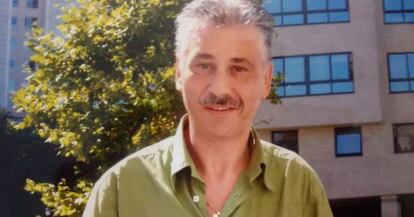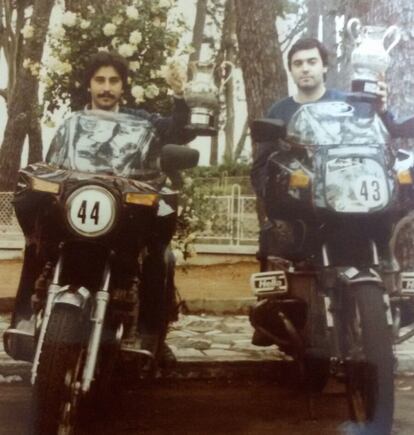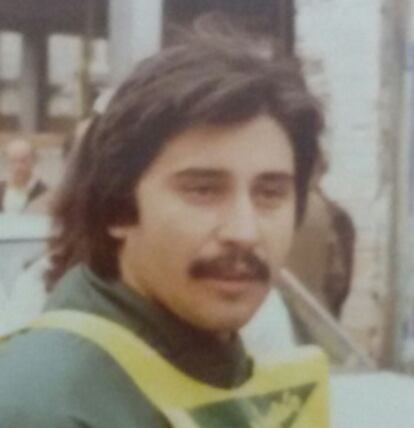I woke up after 15 years in a coma
Miguel Parrondo suffered a car crash in 1987 and did not regain consciousness until 2002 Seeing how many things had changed in the meantime was incredible, he says

In 1987, I was working as a computer programmer at the Banco Pastor bank when I was involved in an accident that left me in a coma for 15 years. In those days, my job was to look after huge computers that used perforated cards: very different to the tiny laptops of today. That is just one of the differences I discovered when I woke up. It is incredible how much the world changed between then and 2002, the year I was born again.
I couldn’t understand why everybody was talking to themselves; but then I had never seen a cellphone”
I was a speed freak. I once won a motorcycle race round my home region of Galicia, and regularly traveled throughout Europe on my BMW 1000RS. And it was speed that led to my accident. I was headed to Santa Cristina, a small village close to A Coruña, which was where people hung out in those days. There were four of us in my Renault 5 GT Turbo: two guys and two girls. But I lost control on a bend and we smashed into a wall. One of the girls died and I, at the age of 32, went into a coma.
I can’t remember anything, but I must have been in a bad state, because my father even called the priest at the hospital to read me the last rites. But I hung on in there. When they saw that I wasn’t getting any better, the doctors asked my father if he wanted them to disconnect me from the life-support machine. But, good Catholic that he was, he told them that only God could take a life. Thanks to his faith, I am alive. Years later, in 2009, there was a lot of talk about an Italian woman, Eluana Englaro, who had been in a coma for 17 years, and whose father wanted to allow her to die. My father insisted that the doctors keep me alive, and after my experience, who would argue with him?

That said, mine must be a one-in-a-million case – that’s what they told me at the hospital where I woke up. I have never met anybody who has been through a similar experience. I’m told that my mother was at my side the whole time in the hospital, until one day in 2002, I opened my eyes. At that moment, my daughter was standing by my bed. “Are you Almudena?” I asked her. When I went into the coma she was aged 12; when I woke up, she was 28. Imagine the shock and the happiness. The brain is an incredible thing.
My daughter’s face is the first thing I remember from my new life. Then came the task of adapting to all the changes, the first of which was the new currency. When I had the accident we were still using pesetas, but when I woke up people were paying in euros. When I left the hospital I couldn’t understand why everybody was talking to themselves; but then I had never seen a cellphone. I also had some geography catching up to do: the USSR no longer existed, and neither did Czechoslovakia or Yugoslavia. But in the end, I didn’t find it too hard to adapt.

There seemed to be so many more cars in A Coruña: were they being given away? There were also underground parking lots all over the place. And the countryside I used to ride around on my motorbike was now filled with streets and houses. I felt like a stranger in my own city.
I also had to get used to my new appearance: the first time I looked in the mirror I saw that my hair had turned gray. My clothes from before no longer fitted me, as I was bloated from the medication – and they were all way out of fashion, anyway. Pretty much the only good thing about being in a coma for a decade-and-a-half was that I didn’t have a single wrinkle. I spent so long without moving my face that I look much younger than my 60 years.
I was given permanent disability status and a state pension, so I’ve never worked since. It would have been incredibly difficult to return to work: if one thing had advanced over those years I was asleep, it was computers. That said, I get bored: by 10 in the morning I’ve read the newspapers and drunk four cups of coffee. I also hardly sleep at all: I think I got all the sleep I’ll need for the rest of my life during those 15 years. Most of my friends are still working, so I spend most days watching videos. I really don’t understand how some people say they don’t want to work. Not having a job is very boring, believe me.
About Verne
One of the things I most regret missing during my 15 years in a coma was the first Spanish motorcycling victories. Before the accident, foreign riders such as Randy Mamola were always winning. Now thanks to Marc Márquez and Jorge Lorenzo, Spain remains on top. Although sometimes when I watch a race it makes me want to cry: I am no longer allowed to ride a motorbike, but I’m thinking of building a trike… I can still get behind the wheel of a car, however.
But I mustn’t complain: looking back, I think I did a lot of things in my 32 years prior to the accident. My approach to life was always: “Life is short and you’re dead a long time.” And despite having lost 15 years as a result of that accident, I can say that I have used my time well.
Text by Álvaro Llorca from an interview with Miguel Parrondo.
Tu suscripción se está usando en otro dispositivo
¿Quieres añadir otro usuario a tu suscripción?
Si continúas leyendo en este dispositivo, no se podrá leer en el otro.
FlechaTu suscripción se está usando en otro dispositivo y solo puedes acceder a EL PAÍS desde un dispositivo a la vez.
Si quieres compartir tu cuenta, cambia tu suscripción a la modalidad Premium, así podrás añadir otro usuario. Cada uno accederá con su propia cuenta de email, lo que os permitirá personalizar vuestra experiencia en EL PAÍS.
¿Tienes una suscripción de empresa? Accede aquí para contratar más cuentas.
En el caso de no saber quién está usando tu cuenta, te recomendamos cambiar tu contraseña aquí.
Si decides continuar compartiendo tu cuenta, este mensaje se mostrará en tu dispositivo y en el de la otra persona que está usando tu cuenta de forma indefinida, afectando a tu experiencia de lectura. Puedes consultar aquí los términos y condiciones de la suscripción digital.








































